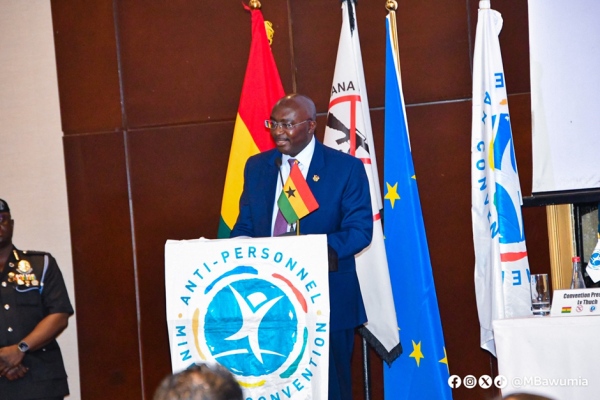Vice President Mahamudu Bawumia has opened the Regional Conference on Addressing the Humanitarian Impact of Improvised Anti-Personnel Mines with a call for urgent action to prevent the thousands of needless deaths and injuries arising from the proliferation of landmines or Explosive Remnants of War (ERWs).
Speaking on Tuesday, February 13, 2024 at the Conference, attended by representatives from all 15 ECOWAS countries, 8 from the Sahel region, UN agencies and organisations, and humanitarian agencies, Vice President Bawumia deplored the debilitating effects of anti-personnel mines on innocent persons, and called for greater cooperation between countries and adherence to the Mine Ban Treaty.
“The use of improvised anti-personnel mines poses a grave threat to civilians, particularly in conflict-affected regions. These insidious weapons indiscriminately maim and kill innocent men, women, and children, inflicting lasting physical and psychological harm. They disrupt livelihoods, impede socio-economic development, and hinder efforts to achieve sustainable peace and security.
“As we gather here today, representing various nations, organizations, and stakeholders, we unite under a common goal: to confront and mitigate the devastating humanitarian consequences caused by improvised anti-personnel mines.”
The Convention on the Prohibition of the Use, Stockpiling, Production and Transfer of Anti-Personnel Mines and on their Destruction also known as the Mine Ban Treaty seeks an end to the suffering and casualties caused by anti-personnel mines through the pursuit of four core aims: Ensuring universal adherence, clearing mined areas, destroying stockpiled mines, and assisting the victims. The currently convention has 164 State Parties including Ghana.
The Landmine Monitor reported that in 2022, at least 4,710 individuals were killed or injured by landmines or Explosive Remnants of War (ERWs) in 49 states. Among them, 1,661 lost their lives, 3,015 sustained injuries, while the status of 34 remains unknown. Civilian casualties constituted 85% of the total, with nearly half of the civilian victims being children (49%), amounting to a total of 1,071.
As of October 2023, it was also reported by the Landmine Monitor that approximately 60 countries and other areas worldwide were grappling with the detrimental presence of anti-personnel landmines contaminating their territories.
Among these, at least 24 States Parties are either believed or confirmed to be afflicted with improvised mine contamination. These states include some African states such as Burkina Faso, Cameroon, Chad, Mali, Nigeria, and Togo. The presence of improvised mines exacerbates the already grave humanitarian and security challenges faced by these nations, necessitating urgent and concerted efforts towards effective mine clearance and risk mitigation strategies.
Cost
According to Minesweepers, it is currently estimated that there are about 110 million landmines scattered across the globe. While the individual cost of mines ranges from $3 to $30, the expense of their removal varies significantly, ranging from $300 to $1000 per mine.
Considering these figures, the total expenditure for clearing all existing mines is projected to range from a substantial $50 billion to $100 billion. However, the Landmine Monitor (2022) report indicates that States Parties to the Mine Ban Treaty have destroyed more than 55 million stockpiled antipersonnel mines. This underscores the significant financial commitment made by both States and international organizations worldwide towards the effective implementation of the Convention.
Ghana recognizes the urgent need for concerted action to address the humanitarian impact of improvised anti-personnel mines. We remain steadfast in our commitment to promoting a world free from the scourge of landmines and explosive remnants of war.
Vice President Bawumia advocated greater compliance with the laws governing war and the proper production, storage and use of weapons of war, noting that such adherence would go a long way to save lives.
“Compliance with the legal instruments (governing the implementation of the Convention on the Prohibition of the Use, Stockpiling, Production and Transfer of Anti-Personnel Mines) is essential to preventing further human suffering and fostering a safer, more secure world for all. I therefore urge all States that are not Parties to the Convention to strive towards the ratification of the Convention.
“This conference should serve as a vital platform for dialogue, collaboration, and action. We come together with a shared commitment to safeguarding human lives, protecting communities, and advancing peace and stability in our regions. It is imperative that we confront the menace of improvised anti-personnel mines with unwavering determination and collective effort.
“May our deliberations be fruitful, our actions impactful, and our resolve unwavering as we work together to address the humanitarian impact of improvised anti-personnel mines in order to build a future of peace, prosperity and dignity for all.”
The Conference is being attended by a number of high profile personalities including H.E. Dr Ly Thuch, Senior Minister of Cambodia, Vice President of the Cambodian Mine Action and Victim Assistance Authority, and current President of the Anti-Personnel Mine Ban Convention; Margaret Arach Orech, Founder and Director Uganda Landmine Survivor Association and Ambassador for the International Campaign to Ban Lindmines; and H.E Irchad Razaaly, Ambassador of the European Union of Ghana.

